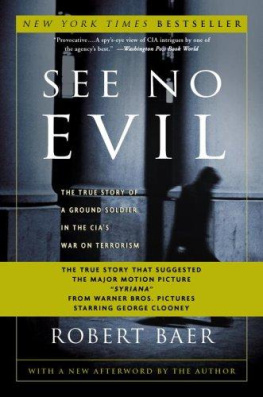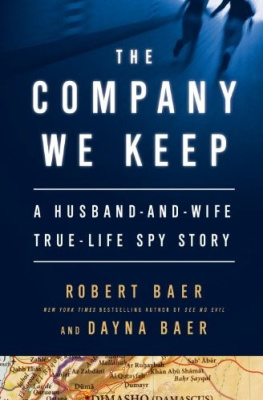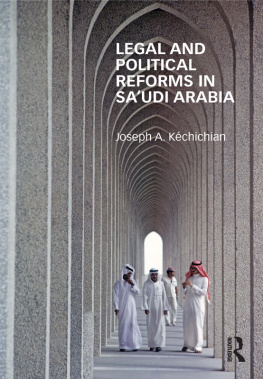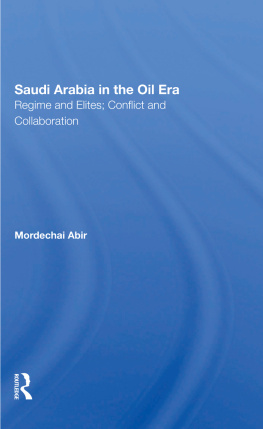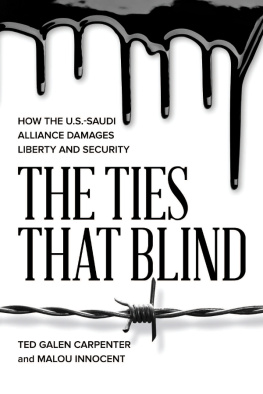Robert Baer
Sleeping With The Devil
How Washington Sold Our Soul for Saudi Crude
Table of Contents
Also By Robert Baer
See No Evil: The True Story of a Ground Soldier in the CIAs War on Terrorism
CIAs Publications Review Board has reviewed the manuscript for this book to assist the author in eliminating classified information and poses no security objection to its publication. This review, however, should not be construed as an official release of information, confirmation of its accuracy, or an endorsement of the authors views.
Grateful acknowledgment is made to Commentary for permission to reprint an excerpt from Oil: The Issue of American Intervention by Robert W. Tucker that appeared in Commentary (January 1975). All rights reserved. Reprinted by permission of Commentary.
Robert Baer
Crown Publishers
New York
TO DANNY PEARL, in recognition of his courage and relentless search for the truth.
Acknowledgments
I WOULD LIKE TO THANK the Saudi experts, petroleum specialists, and Islamic scholars for keeping me on the right track. Thanks to their true expertise, I hope I managed to get the story right. I would also like to thank the numerous talented journalists - all newfound friends since leaving the CIA - whose interests in the Middle East coincide with mine. Our interminable discussions helped me immeasurably to understand the subject. Unfortunately, there are too many to mention by name. Finally, I would like to thank my many Arab friends who patiently tried to explain Saudi Arabia to me. The book could not have been written without them. I hope I got it right and they do not look at this as an anti-Arab or anti-Saudi book. As harsh as some of my views may appear, my sole intention is to attempt to explain why relations between Saudi Arabia and the United States have reached such a low point - and threaten to get worse. Again, as in See No Evil, this book would not have been possible without the research and editorial dictums of Rafe Sagalyn, Howard Means, Kristin Kiser, and Steve Ross, and support from Claudia Gabel, Amy Boorstein, Derek McNally, and Lauren Dong. But, of course, at the end of the day any errors, faulty judgments, and oversights that often pop up in a book like this are all my own.

The House of Saud: An Abbreviated Family Tree
KING IBN SAUD (also known as Abd-al-Aziz) united Saudi Arabia into a single kingdom in 1932 and ruled it until his death in 1953. He had at least forty-three sons, eight of whom died before the age of twenty. Among the most prominent of the survivors:
SAUD. Succeeded his father as king November 1953. Deposed November 1964.
FAYSAL. Proclaimed king November 1964. Assassinated March 1975.
KHALID. Named crown prince March 1975. Died of natural causes June, 1982.
FAHD. Named crown prince March 1975. Proclaimed king June 1982. Incapacitated by a stroke November 1995. King Fahd has seven sons, including his youngest, Abd-al-Aziz (or Azouzi), by his favorite wife, Jawhara Al Ibrahim.
SULTAN. Minister of Defense and Aviation and chairman of Saudi Arabian Airlines, among other titles. Father of Prince Bandar, long-time Saudi ambassador to the United States.
TURKI. Resigned as head of Saudi intelligence just days before the September 11 terrorist attacks. The closest of the princes to the Taliban. Attended Georgetown University with Bill Clinton.
SALMAN. Governor of Riyadh for more than forty years and
de facto head of the Saudi charities some of whose money found its way into al Qaeda.
ABDALLAH. Named crown prince June 1982. Commander of the National Guard since 1963.
NAIF. Current Minister of Interior.
Prologue: The Doomsday Scenario
THE WHITE FORD PICKUP rolled quietly to a stop below Tower Number Seven, one of ten large cylindrical structures at Abqaiq that are used to remove sulfur from petroleum, or turn it from sour to sweet, in oil-patch jargon. A dirty tarp covered the cargo bed; extra-heavy shocks kept the bed from sagging onto the axle. To the east, across the Saudi desert, a hint of the morning sun peeked over the horizon. The truck driver, one of thousands of Shia Muslims who work the Saudi oil fields, cut the engine, checked his watch one last time, and began reciting verses from the Quran, memorized long ago. The lights of the worlds largest oil-processing facility twinkled all around him.
Three hours earlier, a fishing boat equipped with twin two-hundred-fifty-horsepower Evinrude engines had set out from Deyyer, on the southern coast of Iran. By dark, the boat had sprinted across the Persian Gulf to the Saudi port at al Jubayl. From there, the Iranian pilot had crept south, hugging the coastline, until he came in sight of the Sea Island oil-loading platform at Ras Tanura, forty-five miles to the northeast of Abqaiq. Now, with the water beginning to glow pink, he pointed the bow at Platform Four and slammed the throttle to full.
Just inland from Ras Tanura, at Qatif Junction, an Egyptian engineer - a Muslim Brother who had made the grand tour of militant Islam, from Cairo to Tehran - flicked on his flashlight and admired his handiwork. The Semtex was expertly crammed into and around every manifold, every valve, every last pipe junction. It was art, really, lacing it all together in a single charge: a work of beauty, of Allahs great creation.
West of Abqaiq, in the foothills of the al Aramah Mountains at a small Bedouin encampment, a Saudi in his mid-twenties bent over a 120-mm Russian-made mortar for what seemed the hundredth time. A Wahhabi, descended from the religious zealots who brought the House of Saud to power, he had been trained in munitions in Afghanistan by a man who was taught by the Central Intelligence Agency. Below him, at the base of the foothills, sat Pump Station One, the first stop on the oil pipeline that carried nearly a million barrels of extra-light crude daily from Abqaiq across the peninsula to the Red Sea port at Yanbu.
A pager vibrated lightly against his chest and went dead. It was time. The Al Saud were coming down. The oil that fed their whoring and corruption would flow no more. Islam would be purified; the American devils, crippled; and their Israeli protectorate, cut free to die on its own. The world would have to take notice, and for the simplest of reasons: The global economy was fucked.
IVE DOLLED UP the details and updated them, but I didnt invent them. They come courtesy of people who studied the Saudi oil industry from the ground up. From the mid-1930s until well into the 1960s, Saudi Arabia was a branch office of Americas oil giants - a Republican internationalists fantasy. The United States remained secure in the knowledge that Saudi oil would always be there for us, under the sand, cheap, and as safe as if it were locked up in Fort Knox. We built Saudi Arabias oil business and, for our efforts, got full and easy access to its crude.
The first OPEC (Organization of the Petroleum Exporting Countries) oil embargo in 1973 took the bloom off that rose, but anxiety turned into full panic in the early 1980s, during the Iran-Iraq war, especially when it looked as if Iran might take the war to the Arab side of the Gulf, including Saudi Arabia. With the nightmare of an Islamic prairie fire taking down the worlds economy, disaster planners in and out of government began to ask uncomfortable questions. What points of the Saudi oil infrastructure were most vulnerable to terrorist attack? And by what means? What sorts of disruptions to the flow of oil, short-term and long-term, could be expected? And with what economic consequences?


